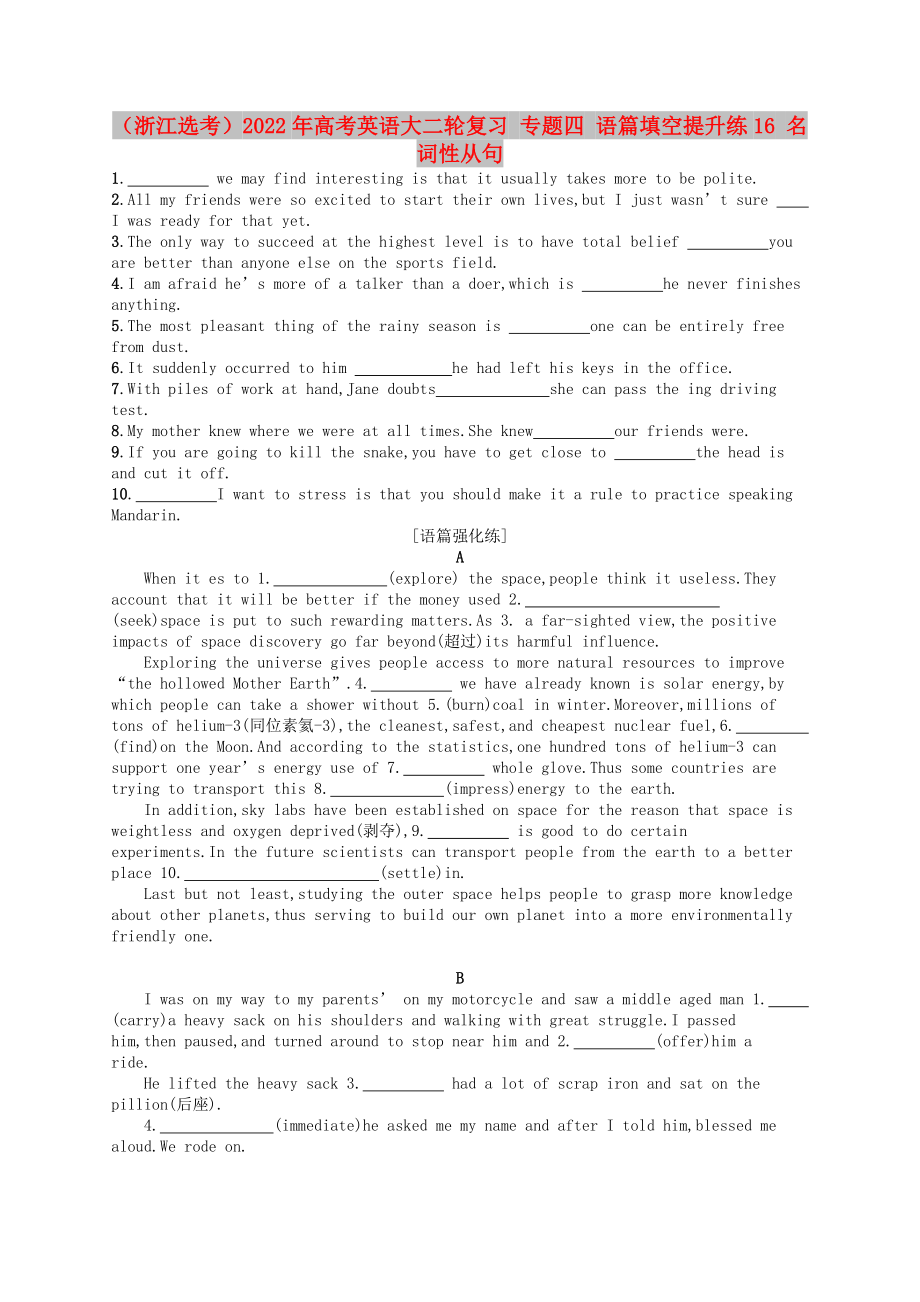《(浙江選考)2022年高考英語(yǔ)大二輪復(fù)習(xí) 專題四 語(yǔ)篇填空提升練16 名詞性從句》由會(huì)員分享����,可在線閱讀,更多相關(guān)《(浙江選考)2022年高考英語(yǔ)大二輪復(fù)習(xí) 專題四 語(yǔ)篇填空提升練16 名詞性從句(4頁(yè)珍藏版)》請(qǐng)?jiān)谘b配圖網(wǎng)上搜索�����。
1�����、(浙江選考)2022年高考英語(yǔ)大二輪復(fù)習(xí) 專題四 語(yǔ)篇填空提升練16 名詞性從句
1. we may find interesting is that it usually takes more to be polite.?
2.All my friends were so excited to start their own lives,but I just wasn’t sure I was ready for that yet.?
3.The only way to succeed at the highest level is to have total
2�����、belief you are better than anyone else on the sports field.?
4.I am afraid he’s more of a talker than a doer,which is he never finishes anything.?
5.The most pleasant thing of the rainy season is one can be entirely free from dust.?
6.It suddenly occurred to him he had left h
3��、is keys in the office.?
7.With piles of work at hand,Jane doubts she can pass the ing driving test.?
8.My mother knew where we were at all times.She knew our friends were.?
9.If you are going to kill the snake,you have to get close to the head is and cut it off.?
10. I want to
4�����、 stress is that you should make it a rule to practice speaking Mandarin.?
[語(yǔ)篇強(qiáng)化練]
A
When it es to 1. (explore) the space,people think it useless.They account that it will be better if the money used 2. (seek)space is put to such rewarding matters.As 3. a far-sighted view,the posi
5��、tive impacts of space discovery go far beyond(超過(guò))its harmful influence.?
Exploring the universe gives people access to more natural resources to improve “the hollowed Mother Earth”.4. we have already known is solar energy,by which people can take a shower without 5.(burn)coal in winter.Moreove
6、r,millions of tons of helium-3(同位素氦-3),the cleanest,safest,and cheapest nuclear fuel,6. (find)on the Moon.And according to the statistics,one hundred tons of helium-3 can support one year’s energy use of 7. whole glove.Thus some countries are trying to transport this 8. (impress)e
7�、nergy to the earth.?
In addition,sky labs have been established on space for the reason that space is weightless and oxygen deprived(剝奪),9. is good to do certain experiments.In the future scientists can transport people from the earth to a better place 10. (settle)in.?
Last but not
8、 least,studying the outer space helps people to grasp more knowledge about other planets,thus serving to build our own planet into a more environmentally friendly one.
B
I was on my way to my parents’ on my motorcycle and saw a middle aged man 1. (carry)a heavy sack on his shoulders and wa
9����、lking with great struggle.I passed him,then paused,and turned around to stop near him and 2. (offer)him a ride.?
He lifted the heavy sack 3. had a lot of scrap iron and sat on the pillion(后座).?
4. (immediate)he asked me my name and after I told him,blessed me aloud.We rode on.?
In
10��、five minutes,we 5. (stop)by a traffic policeman who demanded to see my license.There were many policemen 6. were stopping everyone on that road.My ride got down with his sack and got back on 7. I was through with the policeman’s check.?
We reached 8. (he)destination.He got
11�、off and thanked me again.After reaching home,while parking my motorcycle I saw that iron pieces in the sack that he had placed on the pillion had made deep marks and almost torn the seat in a couple of places.?
I smiled and took it as a reminder he 9. (leave) behind so that I do not forget
12、 10. the pillion is for.?
語(yǔ)篇填空提升練(十六) 名詞性從句
[考點(diǎn)鞏固練]
1.What 引導(dǎo)一個(gè)主語(yǔ)從句,并在從句中作find的賓語(yǔ),用what�����。句意:我們會(huì)發(fā)現(xiàn)有趣的是這通常需要更有禮貌��。
2.whether/if 引導(dǎo)一個(gè)賓語(yǔ)從句,表示“是否”,用whether/if��。句意為:我所有的朋友都準(zhǔn)備開(kāi)始自己的生活,但是我不確定我是否做好了準(zhǔn)備�。
3.that 本題考查同位語(yǔ)從句。句意:通往最高水平的唯一的成功之路就是擁有堅(jiān)定的信念:在運(yùn)動(dòng)場(chǎng)上你比任何人都更棒���。belief后所接的從句對(duì)其內(nèi)容進(jìn)行解釋說(shuō)明,故為同位語(yǔ)從句,that表示陳述一個(gè)事實(shí),故用
13����、that。
4.why 考查表語(yǔ)從句����。句意:我恐怕他是一個(gè)空談家而不是一個(gè)實(shí)干家,那就是他一事無(wú)成的原因?����!皐hich is...”引導(dǎo)的非限定性定語(yǔ)從句中有一個(gè)表語(yǔ)從句,根據(jù)句意用why引導(dǎo)����。
5.that 分析句子結(jié)構(gòu)可知,此處是表語(yǔ)從句,且從句中不缺任何成分,故用that引導(dǎo)。
6.that 句意:他突然想起了他把鑰匙落在了辦公室里�����?�!癷t occurs/occurred to sb.+that從句”是固定句型,意思是“某人突然想起……”���。that引導(dǎo)主語(yǔ)從句����。
7.whether/if 考查賓語(yǔ)從句連接詞�。本句考查doubt引導(dǎo)賓語(yǔ)從句時(shí)連接詞的選擇�����。在否定句和疑問(wèn)句中,dou
14����、bt后面接that引導(dǎo)的賓語(yǔ)從句���。在肯定句中,doubt后面一般接whether或if引導(dǎo)的賓語(yǔ)從句。句意:手邊有很多工作要做,Jane很懷疑自己是否能通過(guò)即將到來(lái)的駕駛考試���。
8.who/where 句意:我母親始終知道我們?cè)谀睦?。她知道我們的朋友是誰(shuí)/在哪里�。根據(jù)句意可知設(shè)空處在賓語(yǔ)從句中作表語(yǔ),設(shè)空處表示身份或地點(diǎn),故用who或where引導(dǎo)。
9.where 句意:如果你想殺死蛇,你得接近蛇頭并將其砍斷���。賓語(yǔ)從句中缺少地點(diǎn)狀語(yǔ),故答案為where����。
10.What 句意:我想強(qiáng)調(diào)的是你應(yīng)該養(yǎng)成練習(xí)說(shuō)普通話的習(xí)慣�����。“ I want to stress”為主語(yǔ)從句,該從句缺少賓語(yǔ)
15��、,故用what引導(dǎo)�����。?
[語(yǔ)篇強(qiáng)化練]
A
【語(yǔ)篇導(dǎo)讀】中國(guó)一系列的太空探索活動(dòng),引起人們特別是青少年對(duì)太空探索的強(qiáng)烈興趣,也引發(fā)了對(duì)“人類為什么要探索太空”和“人為什么要親臨太空”等問(wèn)題的熱烈討論���。
1.exploring 考查非謂語(yǔ)動(dòng)詞���。前面的to為介詞,構(gòu)成:when it es to 句型,所以用動(dòng)詞-ing作賓語(yǔ),意為:當(dāng)涉及……時(shí)。
2.to seek 考查非謂語(yǔ)動(dòng)詞�。這里使用不定式短語(yǔ),表示目的。指花在探索太空的錢����。
3.for 考查固定搭配。這里指從長(zhǎng)遠(yuǎn)角度看,用固定短語(yǔ)as for,意思是“至于,關(guān)于”�����。
4.What 考查名詞性從句����。此處what引導(dǎo)主語(yǔ)從句,
16�����、指我們已知的是太陽(yáng)能��。
5.burning 考查非謂語(yǔ)動(dòng)詞��。此處是動(dòng)詞-ing短語(yǔ)作介詞without的賓語(yǔ),指無(wú)需燃燒煤��。
6.were found 此處考查時(shí)態(tài)和語(yǔ)態(tài)�。這里指發(fā)生在過(guò)去的事情,邏輯上是動(dòng)賓關(guān)系,用一般過(guò)去時(shí)的被動(dòng)語(yǔ)態(tài)��。
7.the 考查冠詞�����。定冠詞the指全球����。這里指全球的能源使用����。
8.impressive 考查詞形變化。此處用形容詞修飾后面的名詞��。指這種能源引人注目。
9.which 考查定語(yǔ)從句���。分析上下文可知,此處是非限制性定語(yǔ)從句,指事物,用which引導(dǎo)����。
10.to settle 考查非謂語(yǔ)動(dòng)詞���。此處是不定式短語(yǔ)作定語(yǔ),指定居的地方�����。
B
【語(yǔ)
17�����、篇導(dǎo)讀】文章描述了一次路上助人為樂(lè)的經(jīng)歷��。
1.carrying 考查非謂語(yǔ)動(dòng)詞�。短語(yǔ)see sb.doing sth.,下文的walking與carrying并列����。
2.offer 考查并列結(jié)構(gòu)。stop與offer是并列的。
3.which/that 考查定語(yǔ)從句���。the heavy sack是先行詞,在定語(yǔ)從句中作主語(yǔ),用引導(dǎo)詞that或which����。
4.Immediately 考查副詞����。副詞修飾整個(gè)句子he asked me my name。
5.were stopped 考查過(guò)去時(shí)的被動(dòng)語(yǔ)態(tài)����。整篇文章用的是過(guò)去時(shí),根據(jù)句中的by可知,we和stop是被動(dòng)的關(guān)系。
6.who 考查定語(yǔ)從句�。many policemen是先行詞,在定語(yǔ)從句中作主語(yǔ),用引導(dǎo)詞who。
7.after 考查連詞����。句意:我通過(guò)了警察的檢查后就又繼續(xù)騎車走了����。根據(jù)句意用連詞after。
8.his 考查代詞����。形容詞性物主代詞修飾名詞destination���。
9.had left 考查時(shí)態(tài)。由句意可知leave behind動(dòng)作發(fā)生在過(guò)去的過(guò)去,故用過(guò)去完成時(shí)����。
10.what 考查賓語(yǔ)從句中的引導(dǎo)詞。what引導(dǎo)賓語(yǔ)從句,在賓語(yǔ)從句中作介詞for的賓語(yǔ)���。
 (浙江選考)2022年高考英語(yǔ)大二輪復(fù)習(xí) 專題四 語(yǔ)篇填空提升練16 名詞性從句
(浙江選考)2022年高考英語(yǔ)大二輪復(fù)習(xí) 專題四 語(yǔ)篇填空提升練16 名詞性從句

